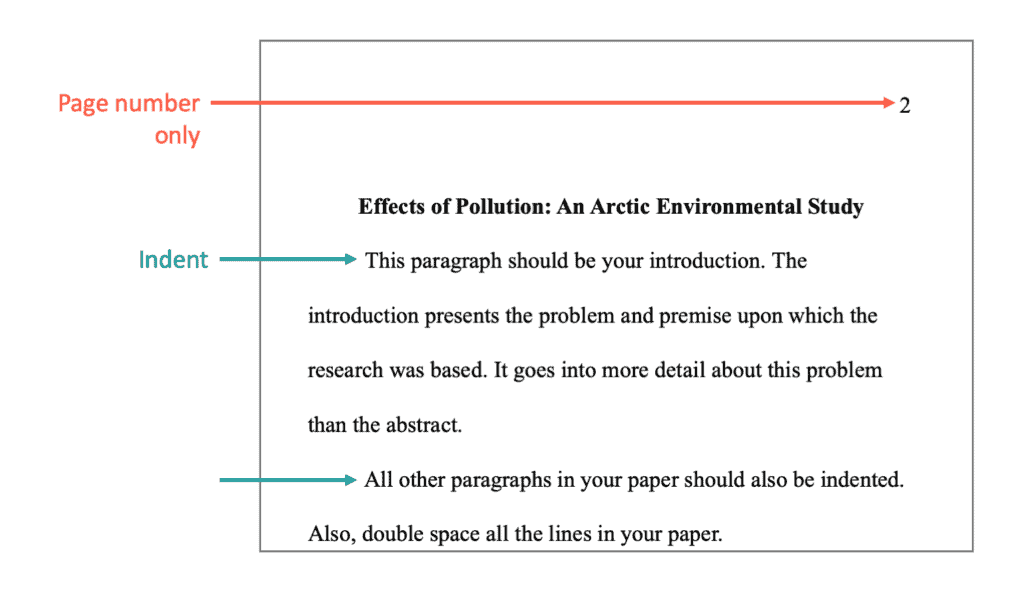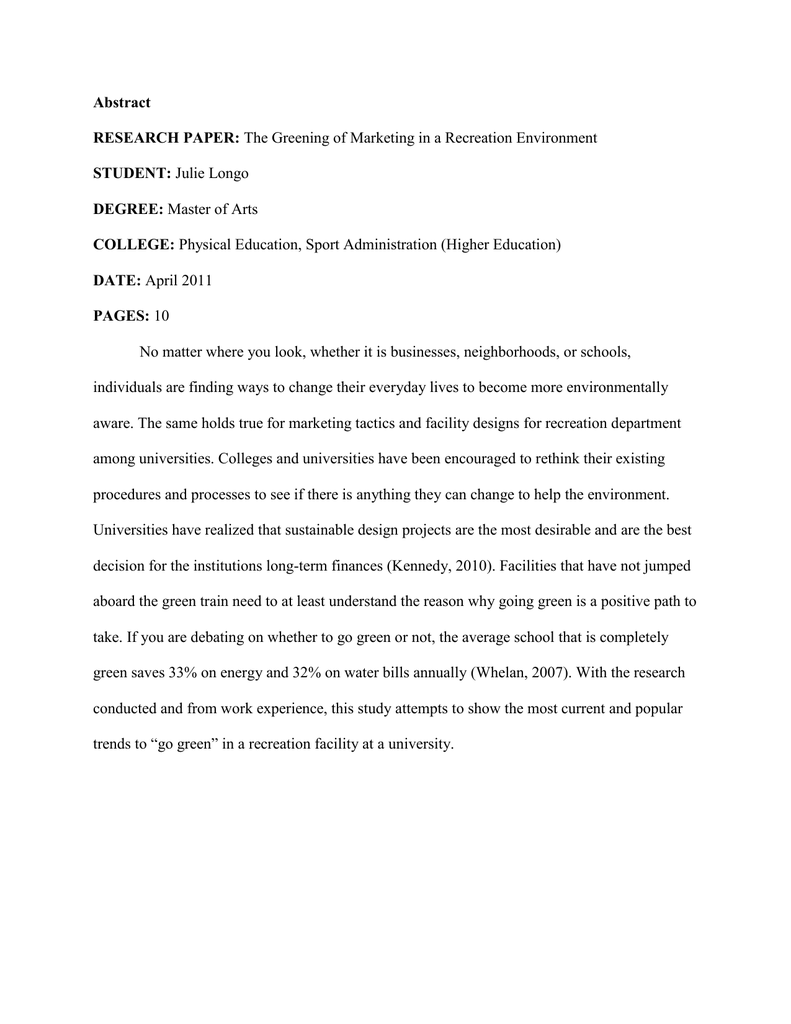
Elements of An Abstract For Research Paper – In the majority of research work, we skip the introduction and directly start our abstract with the objective. Writing an introduction section before objective, just act as a brief description for the reader about what is being written in the objective Your abstract should be intelligible on its own, without a reader’s having to read your entire paper. And in an abstract, you usually do not cite references—most of your abstract will describe what you have studied in your research and what you have found and what you argue in your paper. In the body of your paper, you will cite the specific literature that informs your research 2/28/ · An abstract is a short summary of a longer work (such as a dissertation or research paper). The abstract concisely reports the aims and outcomes of your research so that readers know exactly what the paper is about. Write the abstract at the very end, when you’ve completed the rest of the text. There are four things you need to include
How to make your Abstract more Effective, Abstract offers a Preview
Last Updated: April 8, References Approved. This article was co-authored by Megan Morgan, PhD. She earned her PhD in English from the University of Georgia in There are 13 references cited in this article, which can be found at the bottom of the page. wikiHow marks an article as reader-approved once it receives enough positive feedback. This article has been viewed 4, times. If you need to write an abstract for an academic or scientific paper, don't panic! Your abstract is simply a short, stand-alone summary of the work or paper that others can use as an overview.
It should help your reader understand the paper and help people searching for this paper decide whether it suits their purposes prior to reading. To write an abstract, finish your paper first, then type a summary that identifies the purpose, problem, methods, results, and conclusion of your work.
After you get the details down, all that's left is to format it correctly. Since an abstract is only a summary of the work you've already done, it's easy to accomplish!
To write an abstract, start with a short paragraph that explains the purpose of your paper and what it's about. Then, write a paragraph explaining any arguments or claims you make in your paper.
Follow that with a third paragraph that details the research methods you used and any evidence you found for your claims.
Finally, conclude your abstract with a brief section that tells readers why your findings are important. To learn how to properly format your abstract, read the article! Did this summary help you? Yes No. Log in Social login does not work in incognito and private browsers. Please log in with your username or email to continue. wikiHow Account. No account yet? Create how to start abstract in research paper account.
Community Dashboard Write an Article Request a New Article More Ideas Courses New Tech Help New Expert Videos About wikiHow Pro Upgrade Sign In. Home Random Browse Articles Courses New About wikiHow Easy Ways to Help Approve Questions Fix Spelling Quiz App More Things to Try We use cookies to make wikiHow great.
By using our site, you agree to our cookie policy. Cookie Settings. wikiHow is where trusted research and expert knowledge come together. Learn why people trust wikiHow. Categories Education and Communications Writing Non Fiction Science Writing How to How to start abstract in research paper an Abstract. Download Article Explore this Article parts. Sample Abstracts and Outline.
Tips and Warnings. Related Articles. Article Summary. Co-authored by Megan Morgan, PhD Last Updated: April 8, how to start abstract in research paper, References Approved. Part 1 of Write your paper first. Even though an abstract goes at the beginning of the work, it acts as a summary of your entire paper.
Rather than introducing your topic, it will be an overview of everything you write about in your paper. Save writing your abstract for last, after you have already finished your paper. A thesis and an abstract are entirely different things. The thesis of a paper introduces the main idea or question, while the abstract works to review the entirety of the paper, including the methods and results.
Even if you think that you know what your paper is going to be about, always save the abstract for last. You will be able to give a much more accurate summary if you do just that - summarize what you've already written.
Review and understand any requirements for writing your abstract. Before you start writing, refer to the rubric or guidelines you were presented how to start abstract in research paper to identify important issues to keep in mind. Is there a maximum or minimum length? Are there style requirements? Are you writing for an instructor or a publication? Consider your audience. Abstracts are written to help readers find your work. For example, in scientific journals, abstracts allow readers to quickly decide whether the research discussed is relevant to their own interests.
Abstracts also help your readers get at your main argument quickly. Keep the needs of your readers in mind as you write the abstract. Should it be accessible to a lay reader or somebody from another field?
Determine the type of abstract you must write. Although all abstracts accomplish essentially the same goal, there are two primary styles of abstract: descriptive and informative. Typically, informative abstracts are used for much longer and technical research while descriptive abstracts are best for shorter papers.
These are typically only words. Informative abstracts are like a condensed version of your paper, giving an overview of everything in your research including the results. These are much longer than descriptive abstracts, how to start abstract in research paper, and can be anywhere from a single paragraph to a whole page long.
A critical abstract is not often used, but it may be required in some courses. It may critique the research design or methods, how to start abstract in research paper. Part 2 of Identify your purpose. You're writing about a correlation between lack of lunches in schools and poor grades. So what? Why does this matter? The reader wants to know why your research is important, and how to start abstract in research paper the purpose of it is.
Start off your descriptive abstract by considering the following questions: Why did you decide to do this study or project? How did you conduct your research? What did you find? Why is this research and your findings important?
Why should someone read your entire essay? Explain the problem at hand. Think of this as the specific issue that your research or project addresses. You can sometimes combine the problem with your motivation, but it is best to be clear and separate the two. What problem is your research trying to better understand or solve? What is the scope of your study - a general problem, or something specific? What is your main claim or argument? Explain your methods. Motivation - check.
Problem - check. Now is the part where you give an overview of how you accomplished your study. If you did your own work, include a description of it here, how to start abstract in research paper. If you reviewed the work of others, it can be briefly explained. Describe the evidence you have to support your claim Give an overview of your most important sources. Describe your results informative abstract only. This is where you begin to differentiate your abstract between a descriptive and an informative abstract.
In an informative abstract, you will be asked to provide the results of your study. What is it that you found? What answer did you reach from your research or study?
Was your hypothesis or argument supported? What are the general findings? Give your conclusion, how to start abstract in research paper.
How To Write An Abstract In 5 Minutes? A Practical Guide With Examples!
, time: 6:27Writing an Abstract for Your Research Paper – The Writing Center – UW–Madison

Write your abstract after completing your paper. Although the abstract goes at the beginning of your manuscript, it does not merely introduce your research topic (that is the job of the title), but summarizes your entire paper. Writing the abstract last will ensure that it is complete and consistent with the findings and statements in your paper 2/11/ · They include the main ideas of a book or an article and give a general understanding of its contents and purpose. Sometimes, professors provide students with very specific guidelines for how to write an abstract. Make sure you follow these instructions, if they 5/8/ · An abstract is the main part of a research paper which shows the theme of any research paper. In abstract a short summary and discription of the research paper is explained or blogger.com reading an abstract of any reserarch paper you become able to decide that the perticular research paper is relevant for your study or not. There are five parts of research abstract which you must learn if you

No comments:
Post a Comment